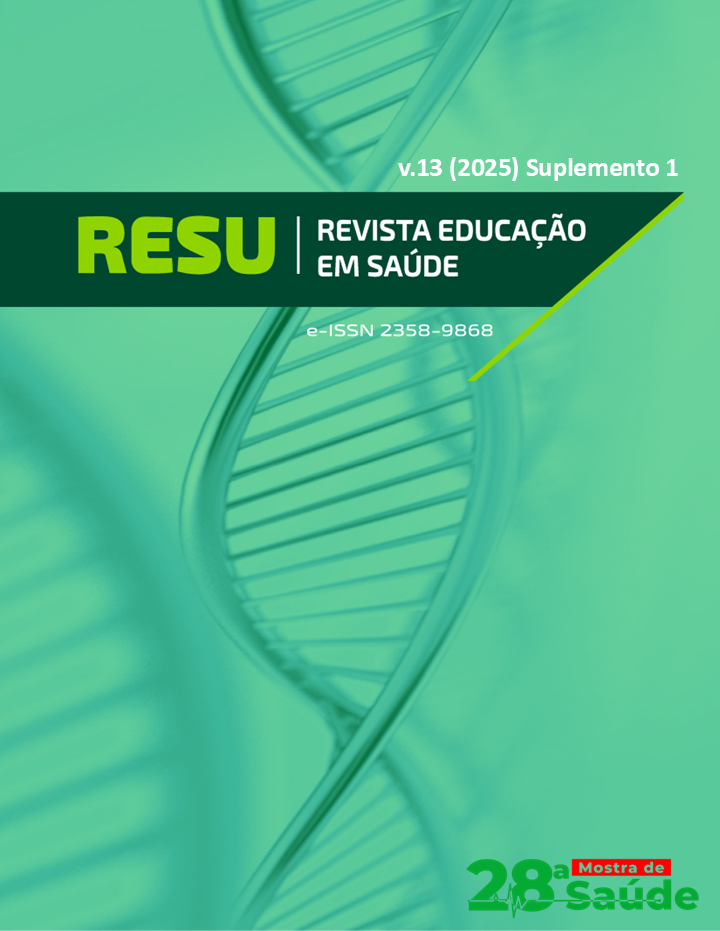Aplicações de Algoritmos de Inteligência Artificial na Detecção Precoce do Câncer de Mama: Uma Revisão Integrativa
Resumo
O estudo teve como objetivo identificar e analisar os avanços na aplicação de algoritmos de inteligência artificial (IA) na detecção precoce do câncer de mama, destacando os principais benefícios, limitações e desafios para sua incorporação na prática clínica. Tratase de uma revisão integrativa, estruturada a partir da estratégia PICo, definida como: População (mulheres com câncer de mama), Interesse (uso de inteligência artificial) e Contexto (detecção, precisão e agilidade diagnóstica). A busca foi realizada nas bases PubMed, SciELO e LILACS, com descritores específicos, abrangendo estudos publicados entre 2020 e 2025, nos idiomas português e inglês, disponíveis na íntegra. Após aplicação dos critérios de elegibilidade, foram incluídos 20 artigos originais, que foram analisados e categorizados quanto ao autor, ano, população e principais achados. Os estudos evidenciaram que modelos baseados em aprendizado profundo e sistemas de diagnóstico assistido por computador (DAC) têm contribuído significativamente para aumentar a acurácia, reduzir falsos positivos e otimizar o tempo de leitura das mamografias. A combinação entre IA e análise humana mostrou melhor desempenho no diagnóstico do que métodos isolados. Apesar dos avanços, persistem desafios como a baixa interpretabilidade dos modelos, a necessidade de validação em populações diversas, a resistência à automação total e as questões éticas e legais envolvidas. A inteligência artificial representa uma ferramenta promissora no rastreamento do câncer de mama, com potencial para melhorar a acurácia, agilidade e personalização do diagnóstico. No entanto, sua adoção plena exige abordagens multidisciplinares, validação científica robusta, supervisão humana contínua e diretrizes éticas claras, a fim de garantir uma implementação segura, eficiente e equitativa nos serviços de saúde.
Referências
- PESAPANE et al. Deep learning performance for detection and classification of microcalcifications on
mammography. European Radiology Experimental, v. 7, n. 1, 7 nov. 2023.
- YU, S. et al. Artificial intelligence–based computer-aided diagnosis for breast cancer detection on digital
mammography in Hong Kong. Hong Kong Medical Journal, 19 dez. 2024.
- SALIM, M. et al. AI-based selection of individuals for supplemental MRI in population-based breast
cancer screening: the randomized ScreenTrustMRI trial. Nature Medicine, 8 jul. 2024.
- ROY, S. D. et al. Computer Aided Breast Cancer Detection Using Ensembling of Texture and Statistical
Image Features. Sensors, v. 21, n. 11, p. 3628, 23 maio 2021.
- RAGAB, D. A. et al. A framework for breast cancer classification using Multi-DCNNs. Computers in
Biology and Medicine, v. 131, p. 104245, abr. 2021.
- RAHMAN, H. et al. Efficient Breast Cancer Diagnosis from Complex Mammographic Images Using Deep
Convolutional Neural Network. Computational Intelligence and Neuroscience, v. 2023, p. 1–11, 2 mar.
- DEMBROWER, K. et al. Artificial Intelligence for Breast Cancer Detection in Screening Mammography
in Sweden: a prospective, population-based, paired-reader, non-inferiority Study. The Lancet Digital
Health, v. 5, n. 10, 1 set. 2023.
- LEHMAN, C. D. et al. Deep Learning vs Traditional Breast Cancer Risk Models to Support Risk-Based
Mammography Screening. JNCI: Journal of the National Cancer Institute, v. 114, n. 10, p. 1355–1363, 25 jul.
- HENDRIX, N. et al. Artificial intelligence in breast cancer screening: primary care provider preferences.
Journal of the American Medical Informatics Association, v. 28, n. 6, p. 1117–1124, 23 dez. 2020.
- LÅNG, K. et al. Can artificial intelligence reduce the interval cancer rate in mammography screening?
European Radiology, 23 jan. 2021.
- GJESVIK, J. et al. Artificial Intelligence Algorithm for Subclinical Breast Cancer Detection. JAMA
Network Open, v. 7, n. 10, p. e2437402, 3 out. 2024.
- LARSEN, M. et al. Artificial Intelligence Evaluation of 122 969 Mammography Examinations from a
Population-based Screening Program. Radiology, v. 303, n. 3, 29 mar. 2022.
- PERTUZ, S. et al. Saliency of breast lesions in breast cancer detection using artificial intelligence.
Scientific Reports, v. 13, n. 1, p. 20545, 23 nov. 2023.
- LEVENTI-PEETZ, A.-M.; WEBER, K. Probabilistic machine learning for breast cancer classification.
Mathematical Biosciences and Engineering, v. 20, n. 1, p. 624–655, 2022.
- DANG, L.-A. et al. Impact of artificial intelligence in breast cancer screening with mammography. Breast
Cancer, 28 jun. 2022.
- GARRUCHO, L. et al. Domain generalization in deep learning based mass detection in mammography:
A large-scale multi-center study. Artificial Intelligence in Medicine, v. 132, p. 102386, out. 2022.
- ONGENA, Y. P. et al. Artificial Intelligence in Screening Mammography: Is the General Population
Ready? Journal of the American College of Radiology, v. 0, n. 0, 12 out. 2020.
- ROY, S. D. et al. Computer Aided Breast Cancer Detection Using Ensembling of Texture and Statistical
Image Features. Sensors, v. 21, n. 11, p. 3628, 23 maio 2021.
- ZHANG, H. et al. Artificial intelligence-based classification of breast lesion from contrast enhanced
mammography: a multicenter study. International Journal of Surgery, v. 110, n. 5, p. 2593–2603, 18 jan.
- ALJUAID, H. et al. Computer-aided diagnosis for breast cancer classification using deep neural
networks and transfer learning. Computer Methods and Programs in Biomedicine, v. 223, p. 106951, ago.


